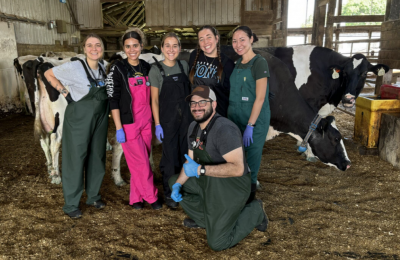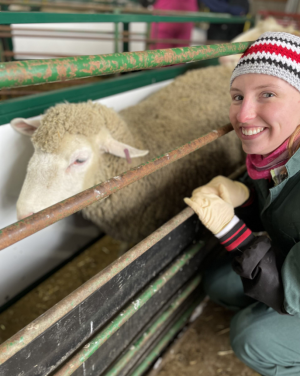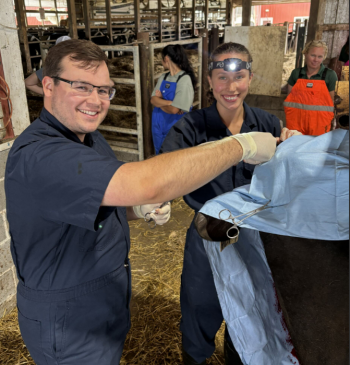A Hands-On Experience in Dairy and Food Animal Medicine
LCS 616 is a required clinical rotation for all veterinary students at the Michigan State University College of Veterinary Medicine. Students will spend two weeks on large animal medicine, two weeks on large animal surgery, and two weeks on food animal medicine and surgery. Designed to provide foundational training in large animal medicine and surgery, this rotation primarily focuses on dairy cattle but also offers limited experience with other food animals, including beef cattle alpacas/llamas, sheep, and pigs.

Rotation Overview
LCS 616 is modeled after a food animal field service rotation, bringing veterinary students directly to the farms. Through partnerships with MSU-owned farms and several family-run farms in Mid-Michigan, students gain hands-on experience that bridges classroom learning with real-world applications. Students are exposed to many different management systems and farm sizes, which are necessary for an all-inclusive experience. This rotation is vital for students to broaden their skillset in large animal and food animal medicine. For those seeking more specialized training, an advanced food animal medicine and surgery rotation as well as production medicine rotation series are also available.
Purpose and Goals
The goal of LCS 616 is to ensure all CVM students have exposure to food animal medicine, with a focus on dairy. This experience allows students to:
- Develop essential skills and confidence in large animal care.
- Build a strong foundation in critical thinking as they work through cases on-site.
- Prepare for day-one readiness by covering core topics for the NAVLE (North American Veterinary Licensing Examination) in each rotation.
Our program is staffed by two dedicated large animal veterinary faculty and a veterinary nurse, ensuring that students receive guidance and support at every step.
What Students Will Learn
Students will develop practical skills and clinical knowledge that are essential for a successful career in food animal veterinary medicine. “Learning by doing” is the teaching philosophy followed by the clinicians who take pride in the hands-on learning experiences students take part in while on the rotation. Key learning objectives include:

- Physical Examinations: Conducting thorough and accurate assessments of large animals.
- Rectal Palpation: Gaining confidence in this critical diagnostic skill.
- Field Surgeries: Learning on-farm procedures in a variety of contexts.
- Field Necropsies: Enhancing diagnostic skills through on-site animal autopsies.
- Blood Chemistry and Milk Cultures: Using in-field laboratory equipment, including a CBC machine and microscopes, to monitor animal health and milk quality.
- Calf Delivery and Dystocia Management: Assisting in calf delivery, including handling challenging cases of dystocia (difficult or obstructed labor).
- Colostrum Monitoring: Ensuring calves receive the nutrients they need from colostrum.
- Calf Management: Learning best practices for the care and management of young livestock.
Fully Functional Field Laboratory

Our team maintains a fully functional lab equipped with advanced tools, such as a CBC machine, chemistry machine, incubator and microscopes, which allows us to conduct blood tests, milk cultures, and other diagnostic procedures. This setup also supports field surgeries and necropsies, enhancing the depth of students' hands-on experience.
Preparing Students for a Successful Career
At the College of Veterinary Medicine, we understand the importance of being prepared from day one. In LCS 616, we cover critical NAVLE topics, ensuring that our students are equipped with the knowledge and skills they need to thrive in their future careers as veterinarians. This rotation serves as an introduction, while our advanced dairy training options allow students to deepen their expertise in food animal medicine to work towards becoming day one ready veterinarians.
